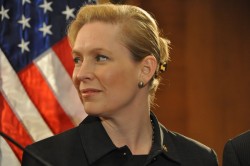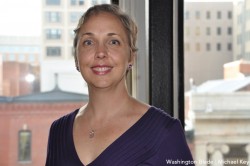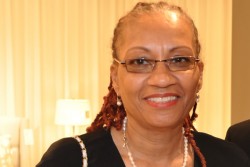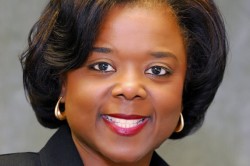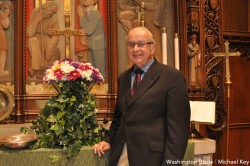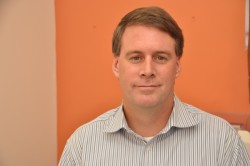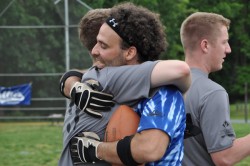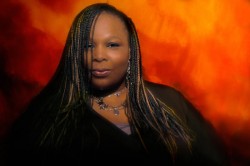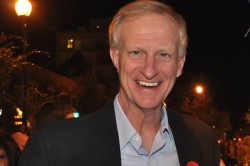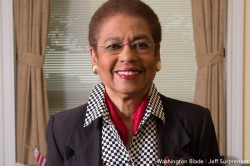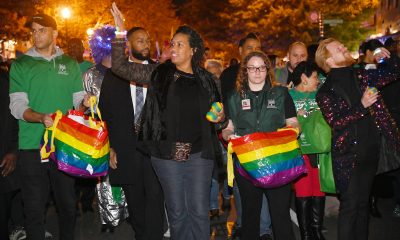Arts & Entertainment
Meet the allies
Straight supporters play key roles in LGBT movement
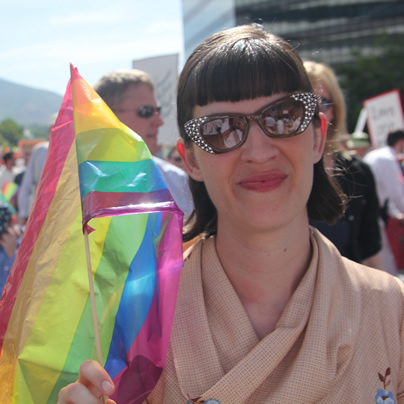
President Obama’s historic announcement endorsing marriage equality stands as perhaps the most prominent example of straight ally support for the LGBT rights movement. But there are many allies working hard to advance equality, from U.S. senators to ministers to community volunteers. Here, we introduce a few straight allies making a difference.
SEN. KIRSTEN GILLIBRAND
U.S. Sen. Kirsten Gillibrand (D-N.Y.) remains one of Capitol Hill’s most visible allies, a role she embraces.
She co-sponsored a Senate bill that would repeal the Defense of Marriage Act and championed the repeal of “Don’t Ask, Don’t Tell” in late 2010.
“I strongly believe that equality is an inalienable American right and should not be ascribed based on gender, race, religion or sexuality,” Gillibrand told the Blade, noting that the end of the ban on openly gay and lesbian service members strengthened national security. “Every American, no matter who you are, or who you love, should be able to serve their country with honesty and integrity.”
Gillibrand had previously backed civil unions for gays and lesbians, but she enthusiastically endorsed marriage rights for same-sex couples once then-New York Gov. David Paterson appointed her to succeed Secretary of State Hillary Clinton in the U.S. Senate in 2009. Gillibrand described President Barack Obama’s endorsement of nuptials for gays and lesbians during an ABC News interview last month as “a watershed moment in American history” that will provide the “leadership needed to finally repeal DOMA and win the unfinished fight for equality for all Americans.”
She also officiated at a same-sex wedding after New York’s law that allows same-sex couples to legally marry in the state took effect last July.
“I have more friends getting married this summer, which I’m looking forward to,” says Gillibrand. She became “teary eyed” when she watched New York City Council Speaker Christine Quinn and her long-time partner Kim Catullo walk down the aisle with their fathers at their May 19 wedding in Manhattan. “I wish them an enormous life of happiness together.”
During a 2010 interview with the Fire Island News, the senator said she’s a former partner in the New York law firm that David Boies, the lawyer who argued against California’s Proposition 8 in federal court alongside former Solicitor General Ted Olson, co-founded in 1997. Gillibrand did not cite a specific moment that prompted her to become an ally, but she referenced her own family when referring to marriage and other LGBT rights.
“It is just clear to me that these issues fundamentally go right to the core founding principles of this country — equality, justice and fairness,” Gillibrand says. “All of America’s families should be protected by the federal rights and benefits that accrue to families. My gay friends who are married, or have children, deserve every bit of protection that my husband and I enjoy. It’s a matter of right versus wrong, it’s a matter of core values of humanity and fairness and freedom and the ability of life, liberty and the pursuit of happiness.”
MICHAEL LAVERS
STAY ON TOP OF ALL THINGS PRIDE! DOWNLOAD THE DIGITAL PRIDE GUIDE TODAY!
MISSY TOMS
When Missy Toms marched in the Capital Pride parade last year, her first, it was a monumental event.
“I had never been in it or even seen it before,” she says. “But I tell you what, when we turned the corner and saw all those people at Dupont Circle, just seeing the joy, the excitement, they were just so proud and happy and just in that moment, it just all clicked for me that this is such an important thing that brings all these different people together. Every age, every level of income, they’re just all there and celebrating and it was such a beautiful experience for me. I was thinking, ‘Oh my gosh, this is how it should be everyday.’”
Toms is the director of external affairs for Capital Pride and handles the fundraising and marketing for the organization. This is her second year in the job and she splits her time between D.C. and Cleveland where she and her husband and three children (ages 13, 9 and 5) live. She knew former Capital Pride president Mike Lutz and saw the chance to do the job last year as a good way to be around her mother who was battling cancer at the time and lived in D.C. (she died in January).
“I knew she was in her last year so it just worked out that I got to be here a lot and spend a lot of time with her last year,” she says. “My contract is on a year-to-year basis, so I’m doing it again this year.”
But aside from personal logistics, Toms says Pride is important. Her brother came out to her when he was 17 and her best friend from college (“It sounds so cliché, but it’s true,” she says), Steve, was gay.
“It was just always something I was familiar and comfortable with,” she says. “I wasn’t political about it then. I got much more aggressive about that as I got older.”
Toms says it’s been surprisingly easy teaching her kids about gay issues.
“We explained to them about marriage, about ‘Don’t Ask, Don’t Tell,’ and my brother got married a few years ago in D.C. right after the law was passed here, so they got to see a gay wedding and I explained to them why this was so important so they completely understand. Kids are so ahead of adults a lot of times on these issues.”
JOEY DiGUGLIELMO
REV. CHRISTINE WILEY
Rev. Christine Wiley, who co-pastors D.C.’s Covenant Baptist United Church of Christ with her husband, Rev. Dennis Wiley, doesn’t remember knowing many LGBT people in her childhood or young adult life, but she does recall her mother teaching her about discrimination.
“I remember my mother saying to me, and this was a British-born black woman who grew up in the poor parts of London. Her mother was a white woman who was married to a man from the Caribbean in the ‘30s, you can imagine there was all kinds of discrimination she knew with that situation, but she said, ‘Don’t ever believe you’re better than anyone else,’” Wiley says. “She told me, ‘Some people don’t like whores and funny men,’ but she said they were some of the nicest people in the world. People used to say if someone was gay, they were funny. … Even as a young adult, I never remember having any bad feelings about gay people and I remember being annoyed when other people would say things … I always remember thinking that God made all people and I couldn’t figure out how people could say they were bad or were going to hell for this.”
The Wileys — Dennis is on sabbatical now and was unavailable for comment — are iconoclasts in the D.C. black church world as Baptist ministers whose church is unabashedly open and affirming to LGBT worshipers. Their church, located in Ward 8’s Bellevue neighborhood, has been through major changes in the 27 years they’ve been there (Dennis’s father was the former minister). Though they have roughly the same number of attendees on an average Sunday morning — about 400 give or take — as they had a decade ago, about half the congregation left after they conducted their first same-sex union ceremony in 2007.
“It was over a period of about five years,” she says. “It wasn’t like a mass exodus, but we did lose a lot of people but … on the other hand, we’ve been continually gaining as well and had a lot of people come who have a much stronger social justice stance. Many people identify us by our stance on LGBT issues but that’s not really the biggest part of who we are. It just happens to be one of the things we teach and believe.”
In addition to a belief that scriptural passages seeming to condemn gay sex have been misconstrued over the centuries, Wiley says the bigger picture for her is her belief in what she calls “liberation theology.”
“We see Jesus as the great liberator and Jesus is a person who was not afraid to count the cost,” she says. “You see this example so often in the Bible, with so many of the prophets of the Old Testament who were not afraid to speak truth to power. Part of our stance is that we cannot be politically correct all the time. We must do what we feel the Bible has called us to do. Was it hard at first? Yes. But when you really take injustice issues and see that as a big part of your life, there’s no other way. Can you speak to every single social injustice issue that’s out there? No. But this is one issue that we’re very clear that we’ve been called to speak to.”
JOEY DiGUGLIELMO
SHARON LETTMAN-HICKS
Sharon Lettman-Hicks, executive director and CEO of the National Black Justice Coalition, chooses her words carefully. She prefers to think of herself as a “sister of the movement,” and says the word ally is, for her, a misnomer. She’s also very clear about what she sees as her role at the helm of the large black LGBT political organization she oversees.
“I don’t see it that I’m fighting to help straight people understand,” she says. “I feel I’m teaching non-LGBT people to see the errors in their judgment. I don’t feel I have the license to speak on behalf of my brothers and sisters in that way, but to be a mirror for non-LGBT people to show them the conduct they should be affording my brothers and sisters. I think it’s a very nuanced way of looking at it and I don’t feel that LGBT people should have any necessity to explain why they should be treated equally.”
In practical ways, she understands being dubbed an ally is one way to look at it, but she prefers words that resonate more deeply with black Americans. And she’s not afraid to be blunt.
“From a business perspective, yes, I’m an ally, but culturally speaking, black people understand family, so when I’m speaking as an ally, it sounds like a cultural transaction. You’re doing something for me and we should be grateful. But I don’t think any LGBT person should feel grateful for getting respect. We should demand it. Thank you for accepting me? How dare you? Get out of my way. You don’t legislate people. Don’t think I’m going to let your rhetoric go unchallenged. I see my role as educating people on why their thought process of discrimination, homophobia and judgment is misplaced, inappropriate and unwelcome.”
Lettman-Hicks, who joined the Coalition in 2009 after eight years with People for the American Way, says the discrimination she felt as a child — she describes herself as an “Afro-Latina who was relatively obese for much of my life” — has informed her activism. Her work at People for the American Way and also some LGBT people she knew personally whom she says “were struggling,” was also a catalyst for her work, which she said in time, she has recognized as “a calling.”
“I started to think, ‘OK, what is my social responsibility here,’” she says. “It became kind of a matter of, ‘OK Sharon, step up to the plate or get out of the game’-type situation for me. ‘I know you’re not going to just accept the status quo and sit back and see this stuff going on.’ I grew up in an era where black liberation was a do-it-yourself kind of mindset but we could never ignore that there were many allies in the struggle for civil rights. I don’t consider myself an ally for black LGBT equality, but a sister of the movement, because it’s very much a black family affair, of righting the wrongs that black people have put on our own children, neighbors … I see it as people for whom society has seen as an invisible community and I am honored to be on the front lines of helping my brothers and sisters live authentic lives.”
JOEY DiGUGLIELMO
REV. DEAN SNYDER
While at Foundry United Methodist Church, Rev. Dean Snyder has fought to change his denomination’s ban on same-sex marriages being performed by the church’s ministers or even in Methodist churches. In 2010, the Foundry congregation voted 367-8 to allow same-sex marriages to be performed in the church.
Snyder’s beliefs on LGBT inclusion and equality in the church began at his first ministerial post when a man came to talk to him about his feelings of attraction to other men.
“Whatever degree of awareness I have about human sexuality and same-gender attraction is due to him sharing his story with me and causing me to read and study … and listen to gay people,” Snyder says. “His story was the beginning of the path.”
When interviewing for a post as a campus minister, Snyder was asked to list his core commitments, one of which was increased acceptance of gays and lesbians within the church. This belief became well known and a lot of gay people, especially gay men, came to talk to him.
Snyder’s path as a straight ally may have began nearly 40 years ago, but his beliefs are as strong as ever with his continual fight for equality and inclusion within the United Methodist Church.
In 1996, the denomination’s legislators voted against performing holy unions, covenants and other marriage-like ceremonies for same-sex couples. This addition to the church’s laws also prohibited United Methodist clergy from performing gay unions.
A large portion of Foundry’s congregation is LGBT, including couples that have been in committed relationships for decades. This brought Snyder to question the church’s laws.
“We started doing services to honor gay and lesbian committed relationships, which we argued were not a violation of the rules because we weren’t actually consecrating a marriage,” Snyder says. “But then … when it was clear marriage was going to become legal in Washington, D.C., then we couldn’t fudge anymore. It was either marriage or it wasn’t.”
Snyder says there are many who argue that conducting same-sex unions is against denominational law, but he feels LGBT believers deserve credit for being open with both their faith and their sexual orientation.
“The reason that the various congregations are where they’re at … that have attempted to be inclusive … is because of gay and lesbian people who have taken the risk of being honest about saying they are Christian and they are gay,” Snyder says. “I think the real heroes of this movement are the gay and lesbian people who have taken … an enormous risk … and been honest.”
JULIETTE EBNER
DON BLANCHON
Don Blanchon has served as executive director of Whitman-Walker Health since May 2006 and throughout his tenure, he has made many changes to the organization.
“I have the amazing job of leading one of the best LGBT non-profits on the planet,” Blanchon says.
Just this year, Whitman-Walker announced that its revenue in 2011 left the health center with a $2.6 million budget surplus. This is the second year in a row the center has posted a surplus.
Blanchon’s work as a straight ally comes from his relationship with his younger brother, Robert, who died in 1999 from complications of HIV/AIDS.
The two were very close, considered to be “Irish twins,” born 14 months apart, and Blanchon credits his brother, who was out at an early age, for making him who he is today.
“I saw first hand how he struggled with coming out … saw him struggle to fight HIV every day and … ultimately what the complications from HIV did to him from a health perspective,” Blanchon says. “If you love somebody dearly like I love my brother, when you see somebody really struggle … then ultimately lose their life to something like HIV … it has a tremendously powerful impact on how you’re living and how you make decisions about how you use your time.
Born and raised in New England, Blanchon says he always had an independent view of things, believing in equality and social justice. His parents believed in the importance of community, however it’s defined.
“It’s a personal conviction from my upbringing,” Blanchon says of his work for the LGBT community.
Blanchon says he always circles back to the idea that people love one another. Because of the political atmosphere in D.C., he believes Washingtonians sometimes are more divisive in how some problems are approached as opposed to trying to work together.
“This is something that I’m learning as a straight ally … we do a lot of labeling … both inside and outside the LGBT community and what often times we miss is each of us is especially unique and has gifts and talents and is deserving of love and friendship,” Blanchon says.
JULIETTE EBNER
KATE KELLY
It may seem surprising to find an LGBT ally within the Mormon Church, but Kate Kelly proves change is possible in the conservative church.
The 31-year-old Vienna, Va., resident grew up in a conservative religious home in Oregon and studied at Brigham Young University. It was while she was in Utah that she made what she calls her “first nudge toward becoming an ally.”
Kelly attended her friend’s 2004 same-sex commitment ceremony. Ominous storm clouds had gathered above the garden in which the couple and their friends had gathered, but a rainbow suddenly appeared as the men began to exchange their vows. “It was shockingly beautiful,” Kelly says. “After that ceremony I began to awaken to the possibility that God could approve of a same-sex union.”
Kelly moved to California after she graduated from BYU, but she soon found herself at the epicenter of the debate over the repeal of the state’s same-sex marriage law. Mormon leaders backed Proposition 8 that voters approved in 2008. The backlash against the Church of Jesus Christ of Latter-day Saints was swift.
“This was a terrible time to be a Mormon, and the whole campaign and Mormon participation in it made me sick with worry and agony,” she says. “I was really torn by the pounding of the drums for Prop 8 by the church, and what I felt was right. In the end I voted against Prop 8, but it was a very difficult decision because the church was so heavy handed about the issue.”
A family tragedy made Kelly realize more than ever that her voice within the church was vitally important.
Her husband’s cousin took his life in 2010 — Kelly noted that Todd Ransom was the third gay person to commit suicide in Utah that month. She emotionally recalled at an LGBT Mormon conference at a Northwest Washington church in April that Ransom’s family responded to his sexual orientation as though it was a burden that had been placed upon them.
“Attending his funeral made me realize that active Mormons need to act up and change the dialogue in the Mormon Church and help families accept and love unconditionally their gay children,” Kelly says.
Kelly, whose brother came out as gay last year, concedes that Mormon allies are “certainly few and far between.” She was among the 300 who marched in the Utah Gay Pride Parade through downtown Salt Lake City on Sunday. Kelly remains optimistic that she and others whom she describes as “paradigm pioneers” are making a real difference in the church.
“Change will come,” she says. “I changed my mind and so I know that others can too.”
MICHAEL LAVERS
ADAM STRASBERG
Adam Strasberg, founder of the political media consulting firm Bright Idea Creative, is the son of legendary acting teachers Anna and Lee Strasberg.
He’s been married to his wife Nora for more than 10 years and says he still plays Dungeons and Dragons. But every Sunday in spring and fall, Adam is known on Carter Barron Field as the captain and quarterback of Tie Dye Blue Tsunami — named by Strasberg’s two boys, ages 8 and 5. They’re the first undefeated team in the history of the D.C. Gay Flag Football League. He’s been the straight guy in the gay league since the late 1990s.
“Before there was an organized league, we were just some guys playing pickup on the Mall,” Strasberg says about how he got involved in the game. “I didn’t know it was gay guys for a long time. Basically it was a game with some friends … and I just played for like a year and a half or something, and one day I got there early waiting for the guys to come set up, and a guy showed up, and said, ‘Is this the game that they advertised in the Blade?’”
Strasberg says after more than a decade of play with the group, he’s always felt accepted, and that he’s even recognized and thanked for his involvement in the league, especially since members of the league recorded an It Gets Better video.
“The only time it was ever an issue was last year at Gay Bowl, there was an issue about how many straight guys can be on a team,” says Strasberg of the Houston championship, saying such exclusion never happens in Washington. “It was kind of a silly thing.”
Strasberg says he’s been a member of other flag football leagues in the past, but has dropped out because he didn’t feel comfortable. In the D.C. Gay Flag Football League, he’s always felt a great sense of camaraderie.
“The guys are super competitive, but everybody has the right spirit,” Strasberg said. “I would never think of leaving.”
Strasberg says it’s a privilege to play with the league.
“Here’s the great thing about gay flag football. It’s an opportunity for people to express who they really are, in all senses of the word. I feel like I’m the one who is honored to be part of the league.”
PHIL REESE
LEA GILMORE
Lea Gilmore is more than just an internationally renowned, classically trained pianist and an award-winning blues, gospel and jazz singer who has appeared in more than 45 musical and dramatic theater productions. She is also a deeply religious humanitarian who sings the praises of justice and equality all over the world.
The quest for marriage equality in Maryland is one of many causes that Gilmore firmly believes in and has worked hard to achieve.
She’s a former deputy director of the American Civil Liberties Union of Maryland and a founding member of the Maryland Black Family Alliance. The group advocates for fairness, justice and equality for Maryland black families, including those headed by same-sex households. Over the years she has worked to urge passage of bills that would legalize marriage for same-sex couples.
“Before I went to college, I had never met gay people and had never known any in my Baptist church,” Gilmore says. “When I was a student at Morgan State, I was heavily involved in theater and through that involvement I met many gays. In addition, I saw some family members come out as gay or lesbian and was upset at the ostracism.”
This affected her. “Injustice against a group of people is unacceptable,” she says.
Gilmore feels African-American clergy who oppose same-sex marriage, “should know better as to how the Bible has been used in the past to keep us in our place.” She bristles at some pastors in the media spotlight, such as Del. Emmett C. Burns, Jr. (D-Baltimore County) and Rev. Derek McCoy who vehemently oppose same-sex marriage and use the Bible as a rationale.
In her testimony against an anti-marriage equality bill sponsored by Del. Burns in the House Judiciary Committee in 2010, Gilmore argued, “As African Americans, we know more than most how discrimination is wrong, hurtful and detrimental to all communities …While we respect those with differing opinions, religious traditions should never be used as a weapon against our fellow citizens, or given as the rationale to defeat civil protections. We have trod that dark path before.”
Two years later, on March 1, Gov. Martin O’Malley signed the law that legalizes same-sex marriage in Maryland. Gilmore, who has been married for more than 28 years, told the Blade then, “This is a day that is just so amazing for me. I along with so many others have longed for this day. This is a day we got to see justice happening in Maryland.”
Gilmore not only draws on her talents to make beautiful music, but to help realize equality for all. “I am deeply committed to the fight for LGBT equality, and as my grandmother said ‘I ain’t tired yet.’”
STEVE CHARING
JACK EVANS
Since his election in 1991 as a member of D.C. City Council from Ward 2, Democrat Jack Evans has been the lead sponsor or co-sponsor of virtually every LGBT-supportive bill or resolution that has come before the legislative body.
He announced his support for allowing same-sex couples to legally marry in the city years before Council voted 11-2 in 2009 to approve the city’s same-sex marriage law. Evans was among the 11 Council members to vote for the law.
In his first year in office, Evans emerged as a leader in efforts to repeal the city’s sodomy law, which classified gay sex as a crime, even if engaged in within the privacy of the home. Working with the late D.C. gay rights leader Frank Kameny, who in 1993 drafted a proposed bill to repeal the sodomy law, Evans and other Council members shepherded the bill through Council, which passed it later that year.
Evans also played a key role in working with local gay rights leaders in introducing or co-sponsoring a series of domestic partnership bills, which Council passed in the early to middle 2000s. LGBT advocates noted that the bills provided same-sex couples with all of the legal rights and benefits of marriage under D.C. law.
At the time, LGBT advocates determined it wasn’t feasible to ask Council members to pass a same-sex marriage law because the Republican-controlled Congress was certain to overturn such a law or impose on the city an outright ban on gay marriage.
When Democrats gained control of Congress and Barack Obama took office as president in 2009, Evans co-sponsored the bill introduced by gay Council member David Catania (I-At-large) to legalize same-sex marriage in D.C.
Evans has also spoken out against anti-LGBT hate crimes, calling on D.C. police to aggressively investigate hate crimes cases and for the U.S. Attorney’s office to make sure persons arrested for committing hate crimes are “prosecuted to the full extent of the law.”
Evans is running for re-election unopposed this year with the strong backing of LGBT activists, including the Gertrude Stein Democratic Club.
“I have served Ward 2 with pride since 1991 and will continue to fight on behalf of the GLBT community to ensure that everyone enjoys the same rights and privileges,” Evans said in a statement. “More than that, I will continue to speak out against discrimination and prejudice when I see it.”
LOU CHIBBARO JR.
ELEANOR HOLMES NORTON
Since her election to the House of Representatives in 1990 as D.C.’s congressional delegate, Eleanor Homes Norton (D) has become known as one of the strongest supporters of LGBT rights in Congress.
In addition to being an outspoken defender of LGBT equality on the House floor, activists say Norton has worked tirelessly behind the scenes to lobby her congressional colleagues in support of pro-LGBT legislation and against anti-gay bills and amendments.
Among other things, Norton has been credited with helping persuade her House colleagues to oppose and defeat attempts to attach various anti-gay amendments to the city’s budget, which Congress must approve every year.
Rick Rosendall, vice president for political affairs of the Gay and Lesbian Activists Alliance, has said Norton worked closely with a coalition of local and national LGBT groups in mapping a strategy for avoiding congressional interference when D.C. Council approved the city’s same-sex marriage law in 2009.
A native Washingtonian, Norton received a law degree from Yale University and began her career in the 1960s in New York City as assistant legal director of the American Civil Liberties Union.
In connection to her ACLU work, Norton spoke out in support of gay rights as early as 1967, two years before New York’s Stonewall Riots of 1969, according to Cartwright Moore, a member of Norton’s congressional staff.
In 1970, then-Mayor John Lindsay appointed her as head of the New York City Human Rights Commission, where she served until 1977. Norton served from 1977 to 1981 as head of the U.S. Equality Employment Opportunity Commission in Washington under President Jimmy Carter.
Since 1982 and continuing through her tenure in Congress, Norton has served as a professor of law at Georgetown University.
Local gay activists have said they were impressed with Norton’s knowledge and understanding of the gay rights movement when she entered the race for the city’s congressional delegate seat in 1990 in the Democratic primary. Norton’s main opponent was then-D.C. Council member Betty Ann Kane (D-At-Large), a strong supporter of LGBT rights.
Although impressed with Norton’s grasp of LGBT issues, the Gertrude Stein Democratic Club, an LGBT group, endorsed Kane over Norton, saying Kane had a longstanding record of support on gay issues during her tenure as a Council member.
Norton beat Kane in the primary by a 39-33 percent margin and easily won the general election in November 1990. The Stein Club and nearly all the city’s LGBT political activists have backed Norton in every election since that time, including her bid this year for her 12th term in office, in which she’s running unopposed.
LOU CHIBBARO JR.
MEGHAN McCAIN
The Republican Party is further along on LGBT rights and same-sex marriage than you might guess, according to Meghan McCain.
“As a Republican, I just meet a lot of Republicans that privately say they don’t think gay marriage is that big of an issue,” McCain said. “They privately support it, but publicly they don’t want to because it goes against the grain of being a Republican. I just feel like if everyone would start being honest about the actual feelings about the issue that more progress would be made.”
McCain — the daughter of Sen. John McCain (R-Ariz.) — gained notoriety during the 2008 presidential campaign for her blog, McCain Blogette, about her experience on the campaign trail. A supporter of same-sex marriage, McCain spoke at the 2009 convention of the Log Cabin Republicans, posed in a NOH8 campaign photo and criticized congressional candidate Samuel Joseph Wurzelbacher, or “Joe the Plumber,” for saying he wouldn’t want “queers” around his children.
“I do a lot of television and people pay me to speak my opinion, and I’m always honest,” McCain said. “And I believe that in America … how can you regulate who gets to do one thing while others don’t? It just completely goes against the ideal America was founded on.”
In addition to speaking out for LGBT rights, McCain has become a contributor to The Daily Beast and MSNBC and published a book this year with Michael Ian Black called “America, You Sexy Bitch: A Love Letter to Freedom.”
Asked about her views on the upcoming presidential election, McCain had harsh words for both President Obama and presumptive Republican presidential nominee Mitt Romney, saying they both were deficient on LGBT issues.
McCain faulted Obama for coming out in favor of same-sex marriage personally but not backing legislation mandating marriage rights for gays, saying “it’s a myth to say that President Obama has been such an advocate” for the LGBT community.
As for Romney, McCain said, “I don’t think he would be a bigot … but I can’t sit here in good conscience and say Mitt Romney is going to be this great LGBT advocate because most likely he probably won’t.”
McCain said she plans to continue to speak out in hopes of changing minds.
“There was a time in this country when black people couldn’t vote, when women couldn’t vote,” McCain said. “If you go to history, any kind of prejudice for one person being different always ends up failing. And history looks back on it with disgust. … Do you want to have your children and your grandchildren look back on this time and think that you’re on the wrong side of history?”
CHRIS JOHNSON
Movies
Heartfelt ‘Wedding Banquet’ remake a romcom worth seeing
Mishaps, crossed wires, conflicts are all part of the fun
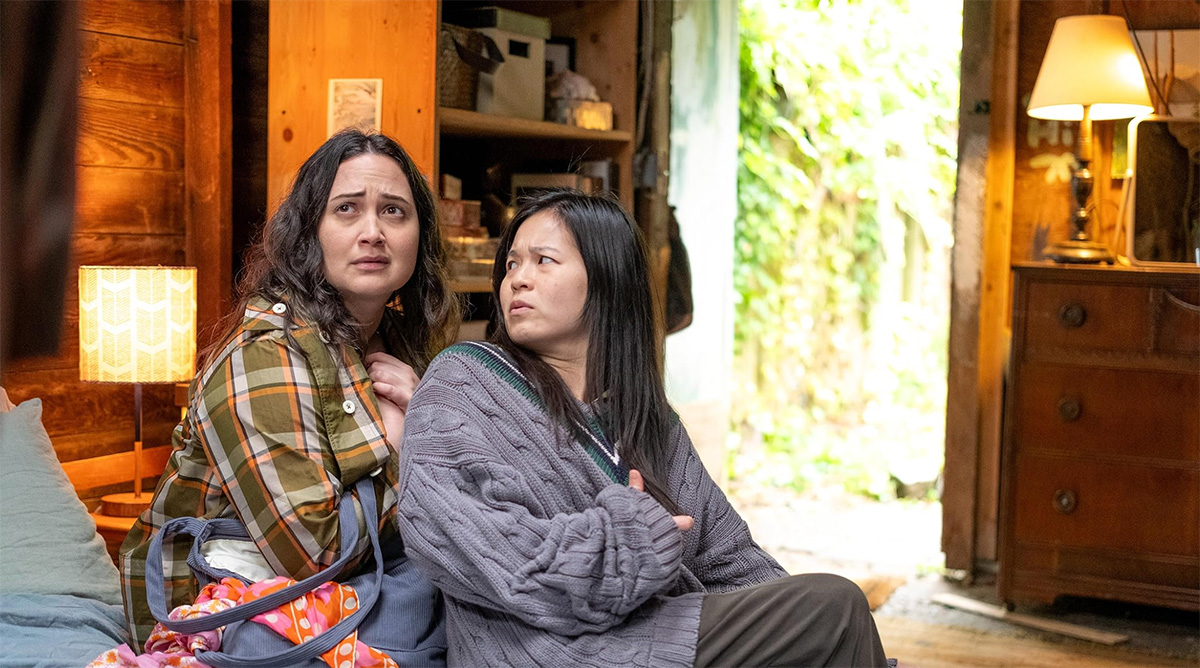
Creating a worthy remake can be a tricky proposition, especially when the movie being remade is a beloved classic – but that doesn’t mean it’s an impossible one.
Consider Andrew Ahn’s new version of 1993’s “The Wedding Banquet,” a film that put future “Brokeback Mountain” director Ang Lee on the proverbial map in America, which opens in theaters this weekend after a debut at Sundance earlier this year. The original, an American/Taiwanese production which became a surprise hit in the U.S., broke ground with its story — a culture-clash comedy of manners about a queer romantic triangle attempting to stage a sham wedding, it was quickly embraced by LGBTQ audiences thrilled to see representation on the big screen and positive representation, at that, in an era when it was even scarcer than it is today. To undertake a remake of such a film is a bold move, to say the least.
Yet gay Korean American writer/director Ahn (“Spa Night,” “Fire Island”) – has built his blossoming career on films about queer relationships among Asian American characters, with as much (or more) emphasis on family, both biological and chosen, as on romantic partnership; It seems natural, perhaps, for him to reinterpret this influential classic through his own lens, and he’s already proven himself as a filmmaker whose strengths line up perfectly with the material.
Even so, Ahn hedges his bets, perhaps, by collaborating on the new screenplay with James Schamus, who also co-wrote the original (along with Lee and Neil Peng), and the result is a movie that – although it recrafts the original romcom for a newer age and reconfigures its central relationships a bit to “up the ante” on its complications – stays relatively faithful to the broad strokes of its plot.
In this iteration, the New York setting is transposed to Seattle, and the plot revolves around not just one queer romance, but two: Chris and Min (Bowen Yang and Han Gi-Chan), a stalled grad student and his South Korean boyfriend, and their lesbian friends-and-landladies Lee and Angela (Lily Gladstone and Kelly Marie Tran), who are struggling to become parents through expensive IVF treatments. Min, an artist whose temporary visa is about to expire, wants to stay with Chris and build a life in America, but his grandmother (Youn Yuh-jung) – currently running the vast family business empire to which he is heir – wants him to come home and claim his place in the organization. A wedding to Chris would secure him the green card he needs to defy his grandmother’s demands, but it would also mean outing himself as gay and potentially being cut off from his inheritance. As a solution, he offers to pay for Lee and Angela’s fertilization procedure in exchange for a “green card wedding” with the latter, ensuring that he can remain in the U.S. while also remaining in the closet to his family.
Of course it’s an idea as bad as it sounds, but despite some reticence, the couples agree to the plan; but when grandmother decides to come to America and meet the bride in person, the four of them must attempt to pull off a masquerade that escalates far beyond their expectations after she insists on putting on a traditional – and elaborate – Korean wedding worthy of her grandson’s exalted status, all while wrestling with the ambivalence and doubts that begin to encroach on their relationships as the scheme begins to fray at the edges.
Those who’ve seen the original already know that things don’t play out exactly as planned – and anyone who hasn’t won’t be surprised when it doesn’t, anyway. We already told you it was a bad idea.
That, of course, is the charm of the romcom, a genre in which mishaps, crossed wires and conflicts are all part of the fun, and in any case it gives Ahn’s film the opportunity to explore – as Lee did with the original – the more serious and relatable challenges of reconciling our queerness with the deeply ingrained traditions of our cultural background; he does so with gentle wit and an equal measure of respect, but he’s not above getting laughs by pointing up the sheer absurdity that sometimes goes along with the process. Neither does he hesitate to delve into the messiness of queer relationships, even (and perhaps especially) with lifelong friends, or the deep insecurities and self-criticisms which get in the way of sorting them out.
To these ends, “Wedding Banquet” relies heavily on its cast, who embrace and clearly relish the chance to flesh out these characters. Yang brings his inevitable “SNL” star power to the table but downplays the wackiness in favor of a more nuanced tone, and Gi-Chan shines as his pragmatically idealistic partner; Gladstone’s intelligence and authenticity is a grounding force, while Tran counterpoints her with an eminently likable turn as her spunky-but-anxious misfit of a girlfriend – and the resonance they each bring to the prospect of motherhood highlights the longing for family and legacy that so many queer couples carry as they build their lives together.
It’s not all about the couples, though. Veteran Chinese American actress Joan Chen (“Tai Pan,” “Twin Peaks”) is a scene stealer as Angela’s hyper-supportive mom, whose participation in her daughter’s “lavender wedding” requires her to go against her deepest instincts as a proud ally, and Bobo Le provides a further connection to the theme of family with a charming performance as Yang’s tomboy-ish little sister. The anchoring performance, however, comes from acclaimed Korean star Yuh-jong, whose shrewd, savvy, and staunch portrayal of Gi-Chan’s power player grandma adds a much-needed dose of level-headed wisdom into the midst of the whirlwind.
In the end, Ahn’s update of Lee’s classic comedy scores big points for honoring the original’s message of acceptance and embracing the notion of reimagining our ideas of traditional family structures to meet the needs of an ever-changing world; it also succeeds in maintaining a heartfelt sense of empathy for each of its characters, all of whom appeal to us precisely because of their imperfections and their hangups. None of them are perfect, but all of them are perfectly human, which goes a long way toward making Ahn’s remake feel like more than just the slickly-made feel-good romcom it resembles.
And yet, given the screwball potential and the endless possibilities for farcical developments in the convoluted deception attempted by its sets of lovers, Ahn’s “Wedding Banquet” could have been funnier. Leaning into an idealized and sentimental perspective as it gracefully brings its characters’ lives into place, it occasionally feels a bit “precious,” too “Hollywood” to be believed.
Again, however, this is part of the charm of the romcom: if generations of straight audiences have gotten the chance to buy into idealized big screen fantasies about life and love, then why shouldn’t we enjoy the same privilege?
With that in mind, “The Wedding Banquet” makes for a perfect opportunity to entertain and validate ourselves – and even if it doesn’t tickle your funny bone, it’s a generous enough feast for your queer soul that it deserves you to see it.
Just make sure you bring somebody special to share your popcorn with.
a&e features
Peppermint thrives in the spotlight
In exclusive interview, she talks Netflix show — and the need to resist Trump’s attacks

As an entertainer, there’s not much that Peppermint hasn’t done. She’s a singer, actor, songwriter, reality TV personality, drag queen, podcaster and the list goes on. Most importantly, as an activist she has been an invaluable role model for the trans, queer, and Black communities.
She’s a trailblazer who boasts an impressive list of ‘firsts.’ She is the first out trans contestant to be cast on “RuPaul’s Drag Race” (Season 9). She is the first trans woman to originate a principal musical role for Broadway’s “Head Over Heels.” She was also the first trans woman to compete in the runaway hit series “Traitors,” on Peacock, and she is the ACLU’s first-ever Artist Ambassador for Trans Justice. Her accolades are a true testament of the courage it took for Peppermint to live her authentic self.
We caught up with Peppermint to chat about her activism, taking on bigger roles on screen, our current political and social climate and life beyond the lens. For Peppermint, coming out as trans was not just a moment of strength—it was a necessity.
“It unfolded exactly as I had imagined it in terms of just feeling good and secure about who I am. I was in so much pain and sort of misery and anguish because I wasn’t able to live as free as I wanted to and that I knew that other people do when they just wake up. They get dressed, they walk out the door and they live their lives. Being able to live as your authentic self without fear of being persecuted by other people or by the government is essential to being healthy,” Peppermint tells the Blade in an exclusive interview.
“I was not able to imagine any other life. I remember saying to myself, ‘If I can’t imagine a life where I’m out and free and feeling secure and confident and left alone, then I don’t even want to imagine any kind of a life in the future,’” says Peppermint.
Recently, Peppermint returned for season 2 of Netflix’s comedy “Survival of the Thickest.” She added some spice and kick to the first season in her role as a drag bar owner. This time around, her character moves center stage, as her engagement and wedding become a major plot line in the show. Her expanded role and high-profile trans representation come at just the right time.
“It’s the largest acting role I’ve ever had in a television show, which my acting degree thanks me. It feels right on time, in a day where they’re rolling back trans rights and wanting to reduce DEI and make sure that we are limited from encouraging companies, corporations, industries, and institutions from not only featuring us, but supporting us, or even talking about us, or even referencing us.
“It feels great to have something that we can offer up as resistance. You can try to moralize, but it’s tougher to legislate art. So it feels like this is right on time and I’m just really grateful that they gave me a chance and that they gave my character a chance to tell a greater story.
Peppermint’s expanded role also accompanies a boom in queer representation in Black-powered media. Networks like BET and Starz and producers like Tyler Perry, are now regularly showcasing queer Black folks in main story lines. What does Peppermint think is fueling this increased inclusion?
“Queer folks are not new and queer Black folks are not new and Black folks know that. Every Black person knows at least one person who is queer. We are everywhere. We have not always been at the forefront in a lot of storytelling, that’s true, and that’s the part that’s new. It’s Hollywood taking us from the place where they usually have held us Black, queer folks in the makeup room, or as the prostitute, as an extra—not that there’s anything wrong with sex work or playing a background performer. I’ve played the best of the hookers! But those [roles] are very limiting.
“Hollywood has not historically done and still does not do a very good job of, including the voices of the stories that they make money [on]. And I think they’re realizing [the need] to be inclusive of our stories and our experiences, because for a long time it was just our stories without our actual experiences. It’s also exciting. It’s dramatic. It makes money. And they’re seeing that. So I think they’re just dipping their toes in. I think that they’re going to realize that balance means having us there in the room.”
Peppermint’s activism is tireless. She has raised more than six figures for prominent LGBTQ rights groups, she continues to speak around the nation, appears regularly on major media outlets addressing trans and LGBTQ issues and has been honored by GLAAD, World of Wonder, Out magazine, Variety, Condé Nast and more—all while appearing on screen and onstage in a long list of credits.
Now, under the Trump administration, she doesn’t have time to take a breath.
“I wouldn’t be able to do it if it weren’t second nature for me. Of course, there are ups and downs with being involved with any social issue or conversation and politics. But I am, for now, energized by it. It’s not like I’m energized by like, ‘Ooh, I just love this subject!’ right? It’s like, ‘Oh, we’re still being discriminated against, we gotta go and fight.’
“That’s just what it is. I get energy because I feel like we are quite literally fighting for our lives. I know that is hyperbole in some regards, but they are limiting access to things like housing, healthcare, job security and not having identification. Passport regulations are being put in a blender.”
Peppermint also mentions her thoughts on the unfair mandates to remove trans service members and revoke the rights and resources from the veterans who worked their whole lives to fight for this country.
“When you strip all these things away, it makes it really difficult for people to have a life and I know that that is what they’re doing. When I look around and see that that is what is at stake, I certainly feel like I’m fighting for my life. And that’s energizing.
“The only thing that would be the most rewarding besides waking up in a utopia and suddenly we’re all equal and we’re not discriminating against each other—which probably is not happening this year—is to be able to be involved in a project like this, where we can create that world. It’s also being built by people who are a part of that story in real life and care about it in real life.”
Peppermint is clear on her point that now is the time for all of the letters of the LGBTQ community to come together. Everyone who is trans and queer should be joining the fight against the issues that affect us all.
“Just trust us and understand that our experiences are tied together. That is how and why we are discriminated against in the way[s] that we are. The people who discriminate—just like how they can’t really distinguish between somebody who’s Dominican and somebody who’s African American — you’re Black when you’re getting pulled over. We are discriminated against in much the same way. It’s the same with being trans or queer or gender non-conforming or bi, we all have our own experiences and they should be honored.
“When laws are being created to harm us, we need to band together, because none of y’all asses is gonna be able to stop them from getting rid of marriage equality—which is next. If you roll the tape back to three years ago when somebody was trying to ask me about drag queen bans on readings in school, I was saying they’re coming for trans rights, which comes for bodily autonomy and abortion rights, which comes for gay marriage rights. Those three things will be wiped out.
Peppermint doesn’t take a pause to get fired up and call gay folk out in their obligation to return the favor to the Black trans community.
She shares with us her final thoughts.
“You cis-gender homosexuals need to stand the fuck up and understand that we are standing in front of you. It’s very difficult to understand this and know this, but so many of the rights that we have were hard fought and won by protest and by people fighting very hard for them. And many of those people in every single instance from the suffrage movement, obviously Civil Rights, queer rights, the AIDS and HIV movement—Black queer people have been there the entire time. Trans people have always been a part of that story, including Stonewall. Yes, we are using different terminology. Yes, we have different lenses to view things through, but let me tell you, if you allow us to be sacrificed before you see us go off the side, you will realize that your foot is shackled to our left foot. So, you better stand the fuck up!”
Peppermint for president!
Arts & Entertainment
Washington Blade’s Pride on the Pier returns bigger than ever with two-day WorldPride celebration

The Washington Blade’s Pride on the Pier will be extended to a two-day celebration in honor of WorldPride coming to D.C. this year. Taking place on Friday, June 6 and Saturday, June 7 at The Wharf, this year’s event promises more entertainment, more community, and more pride than ever before — all set against the stunning waterfront backdrop of our nation’s capital.
With the addition of Friday, the party kicks off at 3 p.m., with the inaugural WorldPride Boat Parade at 7 p.m. As an Official WorldPride Partner event, the boat parade will feature 30 decorated boats parading along the Washington Channel. For information on signing up for the boat parade contact Stephen Rutgers at [email protected].
Saturday’s signature Pier Party kicks off at 12 p.m., featuring a drag show, DJ’s, streaming of the WorldPride Parade, and the iconic Fireworks Show Presented by the Leonard-Litz Foundation — one of D.C. Pride’s most anticipated spectacles.
“We’re expanding Washington Blade Pride on the Pier to reflect the excitement and momentum building for WorldPride in D.C.,” said Blade publisher Lynne Brown. “It’s a celebration of our community’s progress and a powerful reminder of the joy and visibility Pride brings to the heart of our city.”
Now in its seventh year, Washington Blade Pride on the Pier extends the city’s annual celebration of LGBTQ visibility to the bustling Wharf waterfront with an exciting array of activities and entertainment for all ages. The District Pier will offer DJs, dancing, drag, and other entertainment. Alcoholic beverages will be available for purchase for those 21 and older.
Pride on the Pier is free and open to the public, with VIP tickets available for exclusive pier access, hosted bars, and private viewing areas for the boat parade and the fireworks show. To purchase VIP tickets visit www.prideonthepierdc.com/vip.
Friday VIP: 5-9 p.m., enjoy an air-conditioned lounge, private bathroom, cash bar and complimentary drink.
Saturday VIP Session #1: 2-5 p.m., enjoy an air-conditioned lounge, private bathroom, catered food, and an open bar.
Saturday VIP Session #2: 6-9 p.m., enjoy the air-conditioned lounge, private bathroom, catered snacks and dinner, and open bar with a front-row view of the fireworks.
Event Details:
📍 Location: District Pier at The Wharf (101 District Sq., S.W., Washington, D.C.)
📅 Dates: Friday, June 6 & Saturday, June 7, 2025
🛥️Boat Parade: 7 p.m. (June 6). 🎆 Fireworks Show: 9 p.m. (June 7)
🎟️ VIP Tickets: www.PrideOnThePierDC.com/VIP
Event sponsors include Absolut, Capital Pride, DC Fray, Infinate Legacy, Heineken, Leonard-Litz Foundation, Mayor’s Office of LGBTQ Affairs, Relish Catering, Washingtonian, and The Wharf. More information regarding activities will be released at www.PrideOnThePierDC.com
-

 District of Columbia4 days ago
District of Columbia4 days agoFinal push to raise funds, fill D.C. hotels as WorldPride nears
-

 District of Columbia3 days ago
District of Columbia3 days agoReenactment of 1965 gay rights protest at White House set for April 17
-

 Maryland4 days ago
Maryland4 days agoFreeState Justice: Transgender activist ‘hijacked’ Moore’s Transgender Day of Visibility event
-

 Hungary4 days ago
Hungary4 days agoHungarian MPs amend constitution to ban public LGBTQ events

